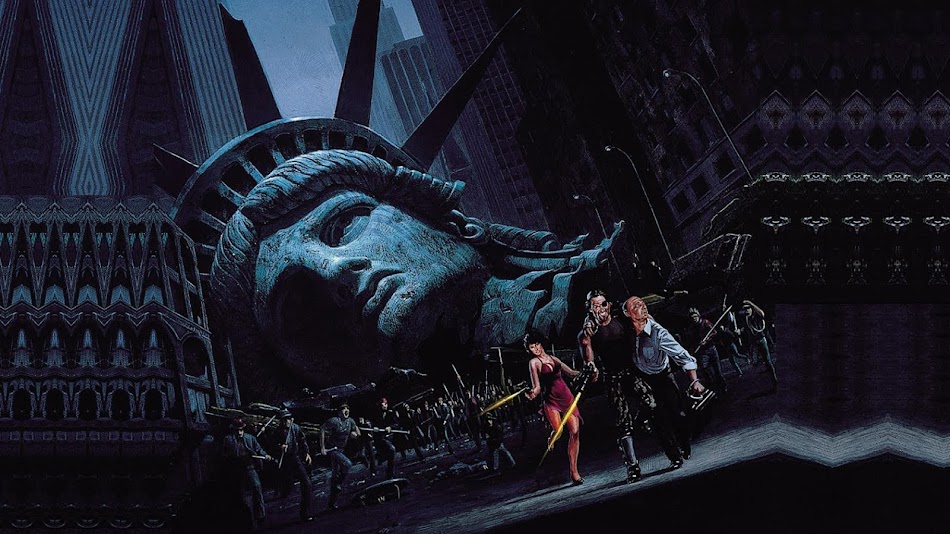(Spain/France - 1982)
Written and directed by Max H. Boulois. Cast: Tony Curtis, Joanna Pettet, Max H. Boulois, Ramiro Oliveros, Nadiuska, Gerard Barray, Fernando Sancho, Aldo Sambrell, Sara Mora, Tom Hernandez. (Unrated, 86 mins)
Martinique-born jack-of-all-trades Max-Henri Boulois has dabbled in a bit of everything over his career: he was some sort of "French athletics prodigy" in the early 1960s before embarking on his career as an author and political commentator. He also found time in the 1970s to record some albums under the name "Max B," parlaying whatever notoriety that brought into a few supporting roles under his "Max B" moniker, which led to a three-film run as independent auteur Max H. Boulois, self-financing, writing, directing, and starring in films under his Spain-based "M.B. Diffusion S.A." production banner. Boulois' filmmaking efforts are little more than clumsy, Martinique-shot vanity projects that are among the most obscure in all of exploitation cinema: 1980's BIG GAME, aka MAD MEX: THE BLACKFIGHTER and the 1981 casino heist thriller BLACK JACK never scored a US release, though by the time of BLACK JACK, Boulois was able to afford real actors like the legendary Peter Cushing and former THUNDERBALL Bond girl Claudine Auger. But Boulois' magnum opus is his ill-conceived, budget-starved 1982 effort OTHELLO (THE BLACK COMMANDO), a modern updating that turns the Shakespeare tragedy into an action film set in an unnamed African country, with Boulois' General Othello leading a band of guerrila fighters against the rule of a tyrannical despot. Shakespeare updates are nothing new in movies, but you know you're in for something special when the opening credits misspell Shakespeare's name.
Like his previous films, OTHELLO (THE BLACK COMMANDO) is pretty much a Boulois home movie, with barely-audible dialogue often drowned-out by the overbearing use of Beethoven selections on the soundtrack. The only real reason to sit through it is to check out a hammy Tony Curtis booze-and-coke-sweating his way through his performance as the duplicitous Col. Iago, Othello's racist second-in-command who plots his superior's downfall. Resentful of Othello and his marriage to humanitarian aid worker Desdemona "DeDe" Fergusson (Joanna Pettet), the daughter of a powerful US senator (Tom Hernandez), Iago sets in motion a complex plan to destroy Othello and Major Cassius (Ramiro Oliveros), and usurp control of the guerilla fighters himself. Curtis sports a ten-gallon hat in a couple of scenes for no reason, and elsewhere rants and raves, likely ad-libbing lines where he expresses his disgust at Othello's "chimpanzee hands, those thick lips, and that smell" all over the privileged, white Desdemona (almost every white male is a vile racist, right down to Sen. Fergusson, outraged over his daughter's marriage, complaining that Othello practices witchcraft and probably "cast a spell" on Desdemona). Boulois doesn't use much of the Bard's actual writing, but when he does, as in one scene where Curtis delivers an Iago soliloquy, it comes off as hokey and awkward amidst the modern vernacular. OTHELLO (THE BLACK COMMANDO) came at a time in Curtis' career when his substance abuse problems essentially made him an unemployable pariah in Hollywood, resulting in appearances in some truly dreadful films like Ulli Lommel's BRAIN WAVES (1983) and the Alexander Salkind fiasco WHERE IS PARSIFAL? (1984). As far as he could be from the likes of SOME LIKE IT HOT and SPARTACUS, desperate for work and probably figuring he could score some primo blow in Martinique, Curtis appears to be invested in this and even showed up at Cannes in 1982 to shill for it, going so far as to sit down with Roger Ebert to discuss it. Cannon chief Menaham Golan acquired the distribution rights to Boulois' film, but didn't do much with it other than dump it in a few foreign territories under their "Cannon International" banner. They never released it in US theaters and it never turned up on video, though it can be found on the bootleg and torrent circuit.
OTHELLO (THE BLACK COMMANDO)'s cult status is minor, due largely to the depressing presence of a slumming Curtis, reduced to appearing in a Eurocine co-production that looks like the typically slipshod Jess Franco films that the French company was financing around the same time. In keeping with the Eurocine tradition, shots vacillate from night to day in the same scenes, while other scenes end abruptly, sometimes in mid-sentence, there's little continuity, and the dialogue--Curtis and Pettet appear to be speaking on-set; Boulois and the others sound dubbed--often ranges from garbled to completely inaudible. There's little sense of pacing, and even with spaghetti western stalwarts Fernando Sancho and Aldo Sambrell in supporting roles, the whole thing is a real snooze when Curtis is offscreen. But such is the life of the cult film enthusiast. Bad-movie fanatics and connoisseurs of trashy cinema are always willing to explore films of the "Does this piece of shit really exist?!" variety, and on that front, OTHELLO (THE BLACK COMMANDO) doesn't disappoint. What can I say? This is the life we've chosen.
 |
| Joanna Pettet during her 1970s heyday |
The hulking Boulois has a bit of screen presence but isn't much of an actor, though as far as self-financed, would-be auteurs go, he's not as bad as, say, John De Hart in GETEVEN, Tommy Wiseau in THE ROOM, or Phil Pitzer in EASY RIDER: THE RIDE BACK. Despite all the ingredients for some outstanding Cinema du Batshit, OTHELLO (THE BLACK COMMANDO) is a pretty dry and tedious affair, very rarely going as bonkers as its misbegotten concept and incompetent execution would imply. After the world failed to embrace his "Sheakespeare" interpretation, Boulois abandoned movies and music and returned to journalism, writing several non-fiction books and being a regular French TV presence in the coverage of European and Middle East politics. His website hasn't been updated since 2011.
(special thanks to Marty McKee for sending me his copy of this--you sure you don't want it back, Marty?)































